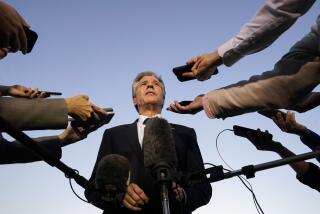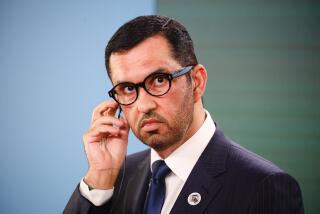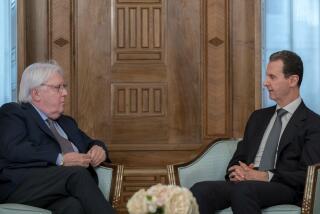Arab summit in Qatar overshadowed by economic crisis
DOHA, QATAR, AND BEIRUT â The global economic crisis is set to plunge a Middle East already reeling from war and extremism into further chaos, the ruler of Qatar cautioned other national leaders and diplomats Monday at the annual Arab League summit.
Sheik Hamad ibn Khalifa al Thani, emir of the tiny but increasingly influential kingdom of Qatar, brushed aside squabbles among Arab states to warn that the world economic crisis would strike a hard blow to the volatile Middle East.
âOur Arab world was among the most vulnerable regions in the world,â Khalifa told the dignitaries assembled in Doha, the capital of his oil- and natural-gas-rich Persian Gulf state.
âThe impact of this problem of lack of confidence has affected the Arab world more than others,â he said. âGiven its location and resources, its issues and problems and its previous and subsequent conditions, the Arab world is in the direction of the wind and the eye of the storm.â
Economic gloom hung over the summit, often a pageant of decorum and flowery rhetoric where substantive issues are superseded by petty rivalries.
The Arab leaders called on Israel to accept a 2002 Saudi peace initiative offering the Jewish state diplomatic recognition in exchange for an independent Palestinian state.
âThe peace initiative being proposed today will not be on offer for a long time,â they said in a statement issued Monday. âArab commitment to this initiative is dependent on Israeli acceptance.â
Arab leaders also voiced support for Sudanese President Omar Hassan Ahmed Bashir, who attended the summit in defiance of an International Criminal Court warrant for his arrest on charges related to the counterinsurgency in Sudanâs Darfur region.
The summit has been replete with the side dramas that characterize most gatherings of Arab leaders.
Egyptian President Hosni Mubarak skipped the summit, apparently upset that Qatar has been stealing the diplomatic limelight. Jordanâs King Abdullah II left early, reportedly because he was received at the airport by a member of the Qatari royal family instead of the emir. Libyan leader Moammar Kadafi stormed out after calling Saudi King Abdullah a dupe of Britain and the U.S.
Amid the recriminations, the summit ended Monday, a day earlier than scheduled.
Diplomats hoped the gathering would help heal the rift between the U.S.-backed Arab states that include Egypt, Saudi Arabia and Jordan and other states, such as Syria, and allied groups, like Hamas and Hezbollah, that lean toward Iran. Syrian President Bashar Assad called for unity even when there are disagreements.
âArab solidarity does not mean that we become copies of each other; it means we complement each other,â he said.
But politics took a back seat to economic worries as the contagion rooted in the collapse of the U.S. financial system and real estate markets begins to affect the Middle East.
In the short term, a decline in food and basic commodity prices has relieved pressure on Arab consumers. Many of the oil-rich gulf states such as Saudi Arabia built up huge cash reserves and sovereign wealth funds during the time of peak oil prices that will help them weather the downturn.
But trouble looms. The French energy giant Total predicts global demand for oil will drop by 2 million barrels a day. Economists say a decline in remittances from Arabs in the West and the Persian Gulf countries and a sharp drop in commodity prices will eventually increase unemployment and unrest in economically fragile countries such as Lebanon, Yemen, Egypt and Jordan. The International Monetary Fund has predicted declines in the growth of gross domestic product across the Arab world for 2009. Analysts say North African nations dependent on trade with a faltering Europe will also be hurt.
âThe Arab countries affected are the ones on the edge of Europe . . . that export [manufactured products] and export labor force to the West,â said Adel Darwish, a Middle East analyst attending the Doha summit. âThe bite is being felt in the southern Mediterranean.â
Even the glitzy Persian Gulf states arenât immune to the downturn. Deutsche Bank recently predicted that economic growth in the United Arab Emirates would slow to 0.4% this year, from 6.4% in 2008.
A recent report by the bank HSBC showed an erosion of business confidence throughout the member states of the Gulf Cooperation Council, a six-nation organization that comprises Saudi Arabia, Oman, Kuwait, Bahrain, the Emirates and Qatar. Nearly 40% of businesses in the gulfâs construction and retailing sectors said they expect business prospects to sour over the coming months, according to the survey, cited in a report by Lebanonâs Byblos Bank.
--
El-Hennawy is a special correspondent.
More to Read
Sign up for Essential California
The most important California stories and recommendations in your inbox every morning.
You may occasionally receive promotional content from the Los Angeles Times.










